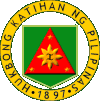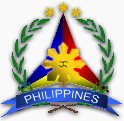Armed Forces of the Philippines
From Worldatplay
| Line 1: | Line 1: | ||
| + | [[Image:AFP.JPG|right|thumb|100px|Seal of the Armed Forces of the Philippines]] | ||
| + | [[Image:Rparmy.gif|right|thumb|100px|Seal of the [[Philippine Army]]]] | ||
| + | [[Image:100pxPN Seal.png|right|thumb|100px|Seal of the [[Philippine Navy]]]] | ||
| + | [[Image:100pxMY ANUS.PNG|right|thumb|100px|Seal of the [[Philippine Air Force]]]] | ||
| + | [[Image:Pmcseal.gif|right|thumb|100px|Seal of the [[Philippine Marine Corps]]]] | ||
The '''Armed Forces of the Philippines''' or '''AFP''' (Filipino: ''Sandatahang Lakas ng Pilipinas'') is the overall unified military of the [[Philippines|Republic of the Philippines]]. | The '''Armed Forces of the Philippines''' or '''AFP''' (Filipino: ''Sandatahang Lakas ng Pilipinas'') is the overall unified military of the [[Philippines|Republic of the Philippines]]. | ||
| Line 4: | Line 9: | ||
*[[Philippine Army]] | *[[Philippine Army]] | ||
| - | *[[Philippine Navy | + | *[[Philippine Navy]] |
*[[Philippine Air Force]] | *[[Philippine Air Force]] | ||
*[[Philippine Marine Corps]] | *[[Philippine Marine Corps]] | ||
Revision as of 06:52, 12 January 2008



The Armed Forces of the Philippines or AFP (Filipino: Sandatahang Lakas ng Pilipinas) is the overall unified military of the Republic of the Philippines.
Its component branches include:
The constitution puts the AFP under the control of a civilian, the President of the Republic of the Philippines, who acts as its Commander-in-Chief. All of its branches are part of the Department of National Defense, which is headed by the Secretary of National Defense. The Secretary is technically a civilian but there had been many instances were the Secretary is former or retired uniformed personnel of the AFP or Philippine National Police.
AFP currently has a total of 113,500 people on active duty and 131,000 people on reserve. Currently, as it is peace time, AFP is a volunteer military. No conscription is done. Women are allowed to join AFP but they are not assigned in combat positions. A considerable fraction of these women are commissioned officers. The average age of its manpower is 18 years old; males aged 15 through 49 are eligible for recruitment and active duty. The 1998 fiscal year expenditures for the Armed Forces of the Philippines totaled 1.5% of the gross domestic product.
Due to its close relationship with the United States military establishment, AFP was considered the strongest national defense program in Asia — especially in the 1950s and 1960s. In 2007, the China Economic Net reported information from a Bangkok-based think tank that the Philippines is the most dependent on U.S. military assistance in all the East Asian countries — receiving approximately 85 percent of the total U.S. military assistance allocated to Southeast Asia, over 10 times more than the next biggest recipient.
AFP is considered to be one of the most stressed militaries in the world. It is at constant war against local secessionist forces like New People's Army, Moro Islamic Liberation Front, and Abu Sayyaf. It is the primary force used for disaster response during calamities like tropical storms, earthquakes, and landslides. However, while being a relatively weak military compared to other countries because of the lack of technologically advanced weapons, AFP soldiers are considered to be one of the most hardened soldiers in the world. Their century long experience in jungle warfare in combating secessionist forces with limited weaponry and technology earned them such description.

